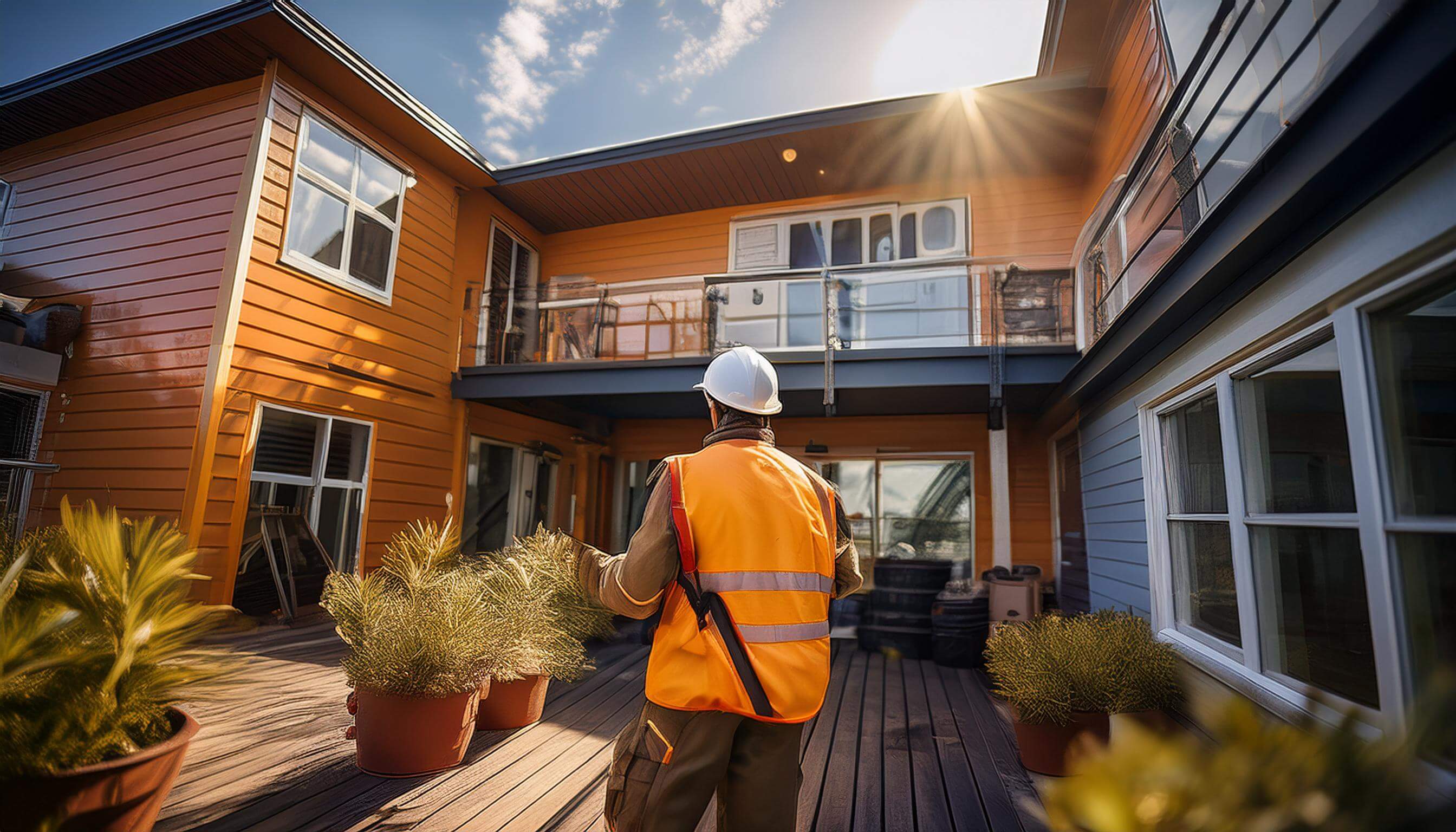SB721 California: Balcony and Deck Inspections in Multi-Family Residences

Table of Contents
In recent years, California has taken significant steps to improve the safety of elevated structures like balconies and decks. The passage of SB721 inspection, along with SB326 inspection, highlights the state’s commitment to ensuring that these exterior elevated elements (EEEs) are thoroughly inspected, maintained, and repaired when necessary. As property owners, understanding these laws is essential to avoid penalties, ensure tenant safety, and maintain the value of your building.
In this blog, we’ll dive into the requirements of SB721, its impact on deck inspections, and why compliance with balcony inspection regulations is so important.
How Often Do Deck and Balcony Inspections Need to Be Conducted?
Under SB721, the first inspection must be completed by January 1, 2025, and every six years thereafter. The inspections must be conducted by a licensed architect, structural engineer, or qualified building inspector.
These deck inspections aim to identify any signs of dry rot, water intrusion, structural instability, or other safety issues. Following the inspection, a balcony inspection report will be provided, outlining any necessary repairs and their urgency. Property owners must act on these findings to avoid liability and ensure tenant safety.
What Should Property Owners Look For During Deck and Balcony Inspections?
While professional inspectors will conduct a thorough evaluation of your balcony or deck, there are several warning signs property owners should be aware of in between inspections. Regular monitoring can help catch issues early before they become dangerous. Key signs of deterioration include:
- Water Damage or Rot: Water intrusion can weaken structural wood over time, leading to dry rot or mold. This can seriously impact the stability of decks and balconies.
- Rust on Metal Components: For balconies with metal railings or connectors, rust can be a red flag. Rusted metal can lose its strength and stability over time.
- Cracks in Concrete or Stucco: Cracks in concrete or stucco balconies can allow water to penetrate and cause further damage to internal structures.
- Loose Railings or Deck Boards: Wobbly railings or loose deck boards should never be ignored, as they can signal serious underlying issues.
Addressing these signs early can prevent costly repairs and ensure your deck or balcony is compliant with balcony regulations.
What Does SB721 Require for Balcony and Deck Inspections?
1. Who Must Comply with SB721?
If you own or manage a multi-family residential building with three or more units, you are legally required to conduct inspections of balcony structures and decks. The law applies to:
- Rental Properties: Apartment complexes and similar residential buildings.
- Buildings with Elevated Elements: Any property with EEEs that extend from the main structure and support live loads.
2. Frequency of Inspections
Under SB721, balcony and deck inspections must be conducted every six years. The first compliance deadline was set for 2025, giving property owners time to schedule their initial inspections and address any necessary repairs.
3. Qualified Inspectors
Only qualified professionals are permitted to conduct SB721 inspections. These include:
- Licensed Structural Engineers
- Licensed Architects
- Certified Building Inspectors
- Licensed General Contractors with relevant experience in balcony and deck safety.
4. What Is Inspected?
SB721 inspections focus on Exterior Elevated Elements (EEEs), such as:
- Balconies and Decks: Checking for structural integrity, rot, and water damage.
- Stairways and Walkways: Evaluating for loose connections, cracks, and stability issues.
- Supporting Structures: Inspecting beams, posts, and other load-bearing components.
Inspectors look for signs of moisture intrusion, wood rot, and rusted fasteners, all of which can compromise the safety of balcony structures.
Contact DrBalcony for a professional inspection!
Ensure the safety of your balcony and living space with DrBalcony - We're a Tech Engineering firm that specializes in California SB326 & SB721 balcony inspections. Over 300+ completed projects in California.
Request A Free EstimateClick To CallWhat Are the Costs Associated with SB 721 Inspections?
The cost of balcony inspections varies depending on the size of the building, the number of balconies or decks to be inspected, and the scope of any necessary repairs. Some property owners may hesitate due to potential costs, but delaying inspections or repairs can result in higher expenses, fines, and potential legal liability.
Investing in an inspection now will protect both your property and tenants, while ensuring compliance with California’s balcony law. For multi-family property owners, the peace of mind that comes with a certified, safe building is invaluable.
The cost of an SB721 inspection varies based on several factors, including:
- Property Size: Larger properties with more balconies and decks will have higher inspection costs.
- Condition of the Building: Older buildings with visible damage may require additional testing.
- Location: Urban areas like Los Angeles and San Francisco may have higher labor and material costs.
| Property Type | Estimated Cost |
|---|---|
| Small Multi-Family (3-10 units) | $2,000 – $4,000 |
| Medium Multi-Family (11-50 units) | $5,000 – $10,000 |
| Large Complex (50+ units) | $10,000+ |
What Should You Do If Your Deck or Balcony Needs Repairs?
If your balcony inspection report shows signs of structural instability, the next step is addressing the repairs immediately. Repairs should be carried out by licensed professionals familiar with balcony and deck structures. The repairs will often involve replacing damaged materials, applying sealants or waterproofing, and strengthening any weakened components.
To ensure your property complies with all balcony inspection regulations, consult with an expert in deck and balcony repair. These professionals will be able to help you navigate the process of bringing your property up to code, ensuring all repairs meet the necessary standards for safety.
Case Study: The Importance of SB721 Compliance
The Problem: A multi-family residential building in San Diego delayed its SB721 inspection, believing the property was in good condition. During the inspection, severe wood rot was discovered in the supporting beams of multiple balconies.
The Cost:
- Inspection Cost: $8,000
- Repair Cost: $50,000
- Fines for Non-Compliance: $10,000
The Lesson: Regular inspections can catch problems early, saving property owners thousands in repair and penalty costs.
Conclusion: SB721 – A Vital Step for Property Safety
SB721 is a crucial law for ensuring the safety of balconies, decks, and other exterior elevated elements in multi-family residences. By staying compliant with balcony inspection requirements, property owners protect both their tenants and the value of their investments.
It’s critical to work with experienced inspectors and contractors to make sure your decks and balconies are safe and up to code. If you’re unsure of where to begin or need a professional opinion, consider reaching out to an expert to guide you through the inspection and repair process.
By adhering to the balcony inspection California regulations and investing in routine inspections, property owners can avoid costly accidents and contribute to the overall safety and quality of the housing market.
Contact DrBalcony for a professional inspection!
Ensure the safety of your balcony and living space with DrBalcony - We're a Tech Engineering firm that specializes in California SB326 & SB721 balcony inspections. Over 300+ completed projects in California.
Request A Free EstimateClick To CallFAQ Section: Top Questions & Answers
My property is well-maintained. Do I really need SB-326/SB-721 inspections?
YES! Even with excellent maintenance, hidden issues can develop due to construction errors, material flaws, or severe weather exposure. Inspections are about ensuring those don’t turn into major problems.
Our balconies were inspected a few years ago – isn't that enough?
Unfortunately, no. California laws mandate inspections on a set schedule, often every 6 years. Deterioration can happen quickly, making regular assessments essential.
Can I use my regular handyman for the balcony inspection?
It’s not recommended. Unless they hold specific licenses (architect, structural engineer, etc.) their inspection won’t be considered valid for SB-326/SB-721 compliance.
What if the inspection uncovers major issues?
First, don’t panic! Early detection often means less extensive (and expensive) repairs are needed. Work with your inspector to prioritize fixes, and explore if they offer repair services for a streamlined solution.
I'm worried about the cost of inspections. Are there any resources to help?
Start by getting detailed quotes from multiple companies. Factor in that proactive inspections help you avoid even bigger costs down the line due to neglected problems. Some property management associations offer guidance on budgeting for balcony compliance.
- List Item #1
- List Item #1
- List Item #1
- List Item #1
- List Item #1
I started off by doing 1 inspection with them back in June because I knew it needed work done. Now, they’ve completed 2 of my properties and have 2 more inspections coming up this month. All great so far! They’re great at keeping me updated
- List Item #1
- List Item #1
- List Item #1
- List Item #1
- List Item #1
I would like to share the fact that this company has been extremely honest and helpful with this challenging project. Balcony and walk way repairs are very expensive, so you want the very best professionals next to you
- List Item #1
- List Item #1
- List Item #1
- List Item #1
- List Item #1
Greg was very helpful in explaining the entire process. They walked me through everything and helped me keep both of my properties in compliance!

